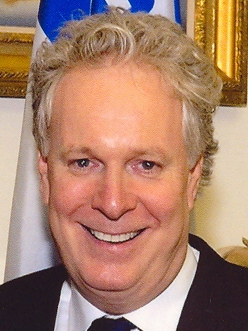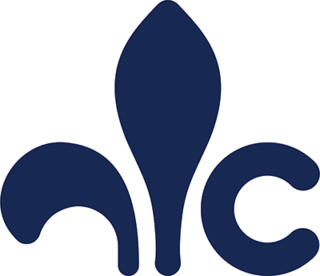
The Action démocratique du Québec, commonly referred to as the ADQ, was a right-wing populist and conservative provincial political party in Quebec, Canada. On the sovereignty question, it defined itself as autonomist; it had support from nationalists and federalists. Its members were referred to as adéquistes, a name derived from the French pronunciation of the initials 'ADQ'.

The New Democratic Party of Quebec is a minor federalist and social-democratic provincial political party in Quebec, Canada. The party is a revival of the comparable Nouveau Parti Démocratique du Québec, which existed in various forms as the federal New Democratic Party (NDP)'s provincial affiliate in Quebec from 1963 to 1991. The current party, however, has never been connected with the federal NDP. The modern party was registered on 30 January 2014.

Pauline Marois is a retired Canadian politician, who served as the 30th premier of Quebec from 2012 to 2014. Marois had been a member of the National Assembly in various ridings since 1981 as a member of the Parti Québécois (PQ), serving as party leader from 2007 to 2014. She is the first female premier of Quebec.

Sébastien Proulx is a Canadian politician. He was an Action démocratique du Québec (ADQ) Member of the National Assembly of Quebec (MNA) for the electoral district of Trois-Rivières from 2007 to 2008. He is a lawyer and was the main political consultant to ADQ leader Mario Dumont until his election.

The 2008 Quebec general election was held in the Canadian province of Quebec on December 8, 2008. The Quebec Liberal Party, under incumbent Premier Jean Charest, was re-elected with a majority government, marking the first time since the 1950s that a party or leader was elected to a third consecutive mandate, and the first time for the Liberals since the 1930s, when Louis-Alexandre Taschereau was Premier.
The Parti indépendantiste was a political party promoting the independence of Quebec from Canada.

The 2012 Quebec general election took place in the Canadian province of Quebec on September 4, 2012. Lieutenant Governor Pierre Duchesne dissolved the National Assembly on August 1, 2012, following Premier Jean Charest's request. The Parti Québécois were elected to a minority government, with Pauline Marois becoming the first woman to be Premier of Quebec. The Quebec Liberal Party took second place, with Premier Jean Charest losing his seat. The newly formed party Coalition Avenir Québec led by François Legault took third place, while Québec solidaire took 2 seats out of the 125.
The Parti Québécois fielded a full slate of 125 candidates in the 1989 Quebec general election. Twenty-nine of the party's candidates were elected, which allowed the party to retain its position as the official opposition in the National Assembly of Quebec.
Parti Montréal Ville-Marie was a municipal political party in the city of Montreal, Quebec, Canada. Led by its founder, Louise O'Sullivan, this political party was founded on May 31, 2005.
The Quebec Liberal Party fielded a full slate of 125 candidates in the 1998 provincial election and won forty-eight seats to retain their status as the Official Opposition party in the National Assembly. Many of the party's candidates have their own biography pages; information about others may be found here.
The Party for the Commonwealth of Canada fielded eighteen candidates in the 1994 Quebec provincial election, none of whom were elected. This party was the Canadian branch of Lyndon LaRouche's movement. Information about the party candidates may be found on this page.
The Estates General of French Canada were a series of three assizes held in Montreal, Quebec, Canada between 1966 and 1969. Organized by the Ligue d'action nationale and coordinated by the Fédération des Sociétés Saint-Jean-Baptistes du Québec (FSSJBQ), the stated objective of these Estates General was to consult the French-Canadian people on their constitutional future.
The New Democratic Party of Quebec fielded ninety candidates in the 1985 Quebec provincial election, none of whom were elected. Information about these candidates may be found on this page.
The Green Party of Quebec (GPQ) is a Quebec political party whose platform is the promotion of green politics. It has not won any seats in the National Assembly of Quebec. Its platform is oriented towards promotion of green values, sustainable development, and participatory democracy.
The governing Quebec Liberal Party fielded a full slate of 125 candidates in the 1994 Quebec general election and elected forty-seven candidates, falling to official opposition status in the National Assembly of Quebec.

The Conservative Party of Quebec is a provincial political party in Quebec, Canada. It was authorized on 25 March 2009 by the Chief Electoral Officer of Quebec. The CPQ has gradually run more candidates in successive elections, with 27 in the 2012 general election and 125 in 2022. The party has not won a seat in the National Assembly of Quebec; however, under leader Éric Duhaime the CPQ won about 12.9% of the popular vote in the 2022 election, a major increase from prior elections. Previously on June 18, 2021 Claire Samson crossed the floor to join the party after having won election in 2018 as a candidate of the governing Coalition Avenir Québec (CAQ).

The 2014 Quebec general election was held on April 7, 2014 to elect members to the National Assembly of Quebec. The incumbent Parti Québécois which had won a minority government in 2012 was defeated by the Quebec Liberal Party under Philippe Couillard who won a majority government of 70 seats, while the incumbent Parti Québécois finished second with 30 seats, becoming the first single-term government since Jean-Jacques Bertrand's Union Nationale government was defeated in 1970. Pauline Marois electoral defeat marked the shortest stay of any Quebec provincial government since the Canadian Confederation. It marked the lowest seat total for the Parti Québécois since 1989 and its smallest share of the popular vote since its inaugural run in 1970, as Premier Pauline Marois lost her own riding. The Coalition Avenir Québec under François Legault made minor gains in terms of seats despite receiving a smaller share of the popular vote than in the previous election. Québec solidaire won an additional seat, though co-spokesperson Andrés Fontecilla failed to win his riding. This election saw the return of the Liberals to power 2 years after their defeat in 2012. To date this is the last election where the Liberal Party won a majority of seats in the Quebec Assembly.

The 2018 Quebec general election was held on October 1, 2018, to elect members to the National Assembly of Quebec. The election saw a landslide victory for the Coalition Avenir Québec (CAQ) led by François Legault, which won 74 of 125 seats, giving the party a majority and unseating the Quebec Liberal Party. The Liberals became the official opposition with 31 seats.
Plateau sans frontières, formerly Intégrité Montréal, is a municipal political party in Montreal, Quebec, Canada.

Paul St-Pierre Plamondon is a Canadian lawyer, television columnist and politician.










